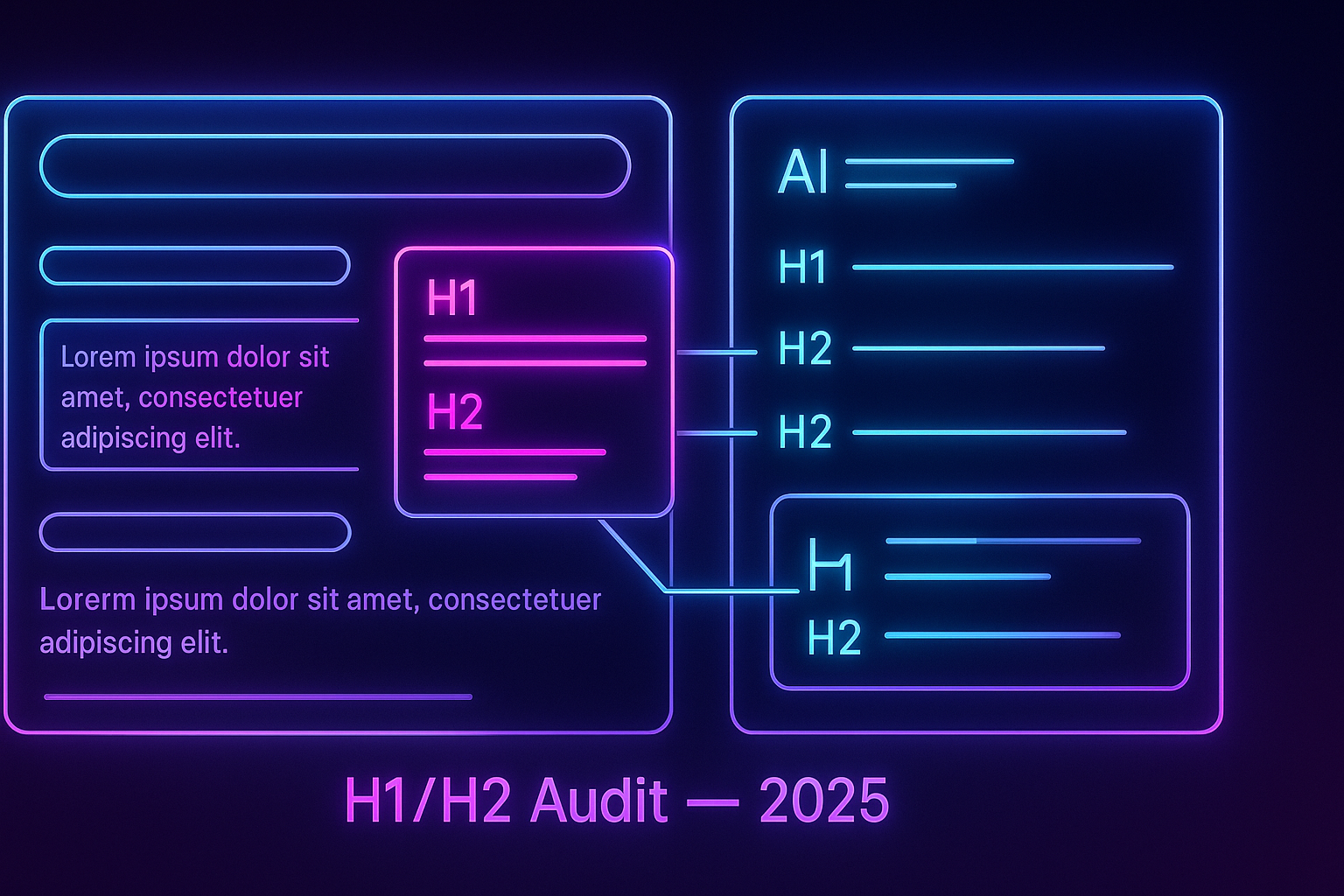Your headings decide what gets summarized. Use this 2025 audit to make H1/H2s align with intent, surface answers early, and earn visibility in AI summaries—plus a rapid QA loop with SEO Horizan tools.
H1/H2: audit tips to win with AI summaries in SERPs in 2025
In 2025, summaries in search interfaces quote and compress what your page makes obvious. If your H1/H2s don’t reflect user intent and ordered answers, your best insights never make the cut. Use this heading-focused audit to align with intent, surface answers early, and verify everything quickly with SEO Horizan.
Why headings rule summaries now
- Extraction bias: Summaries lean on clear, scannable sections and plain-language headings.
- Ranking + CTR: H1/H2s that match searcher phrasing improve snippet quality and selection odds.
- Editing speed: Clean outlines make updates safer and faster across large sites.
Quick workflow: outline → fill → verify (20–40 minutes)
- Baseline preview: Check title/description fit in Google Search Preview.
- Extract truth: Paste the URL in Website Text Extractor to list H1/H2/H3 and the first 100 words.
- Rewrite headings: Align H1 to the core job; convert vague H2s into question-led or outcome-led statements.
- Verify hygiene: Ensure internal links resolve to final 200s via URL Redirect Checker and check headers with HTTP Headers Lookup.
H1 patterns that win (fill-in)
- [Task]: the practical guide (2025)
- [Problem] → [Outcome]: step-by-step (2025)
- [X] vs [Y]: key differences, pricing & use cases
- [Metric] benchmarks for [Audience] (2025 report)
H2 patterns for extraction
| Intent | H2 pattern | Why it helps |
|---|---|---|
| How-to | How to [verb task] (checklist) | Plain directive; easy to quote |
| Comparison | [X] vs [Y]: which to choose? | Directly answers decision intent |
| Pricing | Pricing, limits & calculators | Collects key details in one section |
| Evidence | Proof & examples (screenshots) | Signals original value |
| FAQ | FAQs | Supports Q&A extraction + schema |
“Snippet paragraph” (put under H1)
Add a 40–55 word answer under the H1. This becomes your quoted summary more often than not.
<p class="snippet">[40–55 words: define the problem in user terms, state the outcome, and list the 2–3 steps/tools readers will use. Avoid brand-speak; use plain English.]</p>
Outline template you can copy
<h1>[Task]: the practical guide (2025)</h1>
<p class="snippet">[40–55 words that answer the core query]</p>
<h2>What you’ll need</h2>
<ul><li>[Requirements]</li></ul>
<h2>How to [verb task] (checklist)</h2>
<ol><li>[Step]</li><li>[Step]</li></ol>
<h2>Examples & pitfalls</h2>
<ul><li>[Annotated screenshot or table]</li></ul>
<h2>FAQs</h2>
<details><summary>[Question]</summary><p>[Short, direct answer]</p></details>
<aside class="next">
See also: <a href="/plan">Plans</a> • <a href="/blog">Related guides</a>
</aside>
Anchor hygiene (help summaries quote the right line)
- Use meaningful IDs (e.g.,
id="pricing-limits"notsection-3). - Link to precise anchors from intros and tables of contents.
- Confirm anchors are indexable and not hidden behind tabs.
Evidence beats fluff
- Add one table, screenshot, or downloadable per core section.
- Keep page size < 2 MB and images with explicit sizes; verify in Website Page Size Checker.
- Check alts quickly via Image Alt Tags Checker.
QA checklist for headings (10–15 minutes)
- ✅ H1 matches the searcher’s job; snippet paragraph exists beneath it (confirm with Website Text Extractor).
- ✅ H2s are question- or outcome-led; no vague labels like “Overview”.
- ✅ Title/description preview clean (Google Search Preview), meta/OG parity holds (Meta Tags, OpenGraph).
- ✅ Internal links near the intro point to final 200s (URL Redirect Checker); headers sane (HTTP Headers Lookup).
- ✅ Text-to-HTML ratio looks healthy (Text-to-HTML Ratio Checker).
CSV audit headers (copy this)
URL,H1,Snippet (40–55w),H2_1,H2_2,H2_3,Anchor coverage (Y/N),Proof asset (table/screenshot),Intro internal link (final 200),Notes,Owner,Due
Lightweight JSON-LD (only if visible Q&A exists)
{
"@context":"https://schema.org",
"@type":"FAQPage",
"mainEntity":[
{"@type":"Question","name":"[Question that mirrors an H2/FAQ]","acceptedAnswer":{"@type":"Answer","text":"[Answer that exists verbatim on the page]"}}
]
}
Prioritization (do now → do next)
Item, Impact, Effort, Priority
Add snippet paragraphs under H1 on top pages, High, Low, Do Now
Rewrite vague H2s into question/outcome form, High, Low, Do Now
Add one proof asset per core section, High, Low, Do Now
Fix intro links to final 200 + anchors, Medium, Low, Do Now
Standardize anchor IDs + table of contents, Medium, Low, Next
Meta/OG tune on top entries, Medium, Low, Next
Where to link internally
- From this guide to your Blog hub and related content-quality posts (titles, helpful content, outlines).
- From high-traffic guides back to this H1/H2 audit to keep editors aligned.
- Ensure all priority guides are in your Sitemap.
SEO Horizan Toolbox (bookmark these)
- Google Search Preview • Meta Tags Checker • OpenGraph Checker
- Website Text Extractor • URL Redirect Checker • HTTP Headers Lookup
- Website Page Size Checker • Text-to-HTML Ratio Checker • Image Alt Tags Checker
FAQs
Do I need questions as headings to show in summaries?
No, but question-led or outcome-led H2s increase clarity and extraction odds. Avoid vague labels.
Where should the snippet paragraph go?
Directly under the H1. Keep it 40–55 words in plain language.
Should I repeat keywords in headings?
Use natural phrasing. One clear occurrence beats repetition; focus on intent and outcomes.
Do tabs/accordions hurt extraction?
They can if content is hidden by default. Prefer visible sections or ensure anchors render server-side.
Wrap-up
Summaries reward pages that make answers obvious. Lead with an intent-matched H1, add a snippet paragraph, convert vague H2s into actionable prompts, and back claims with proof. Verify with quick tools and standardize the outline across your library. When you’re ready to operationalize this, create an account or compare Plans.
